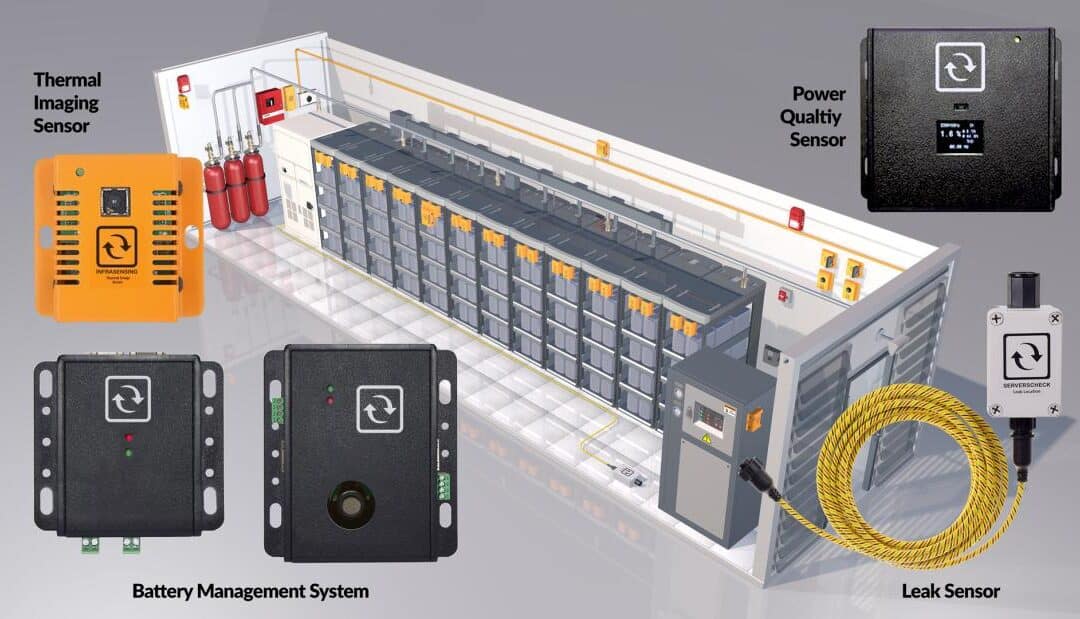This article is the second in our two-part series on battery energy storage systems (BESS). It serves as a more in-depth discussion on the world’s growing BESS market, how it affects fire protection protocol, and what specific products you can use to protect your facility.
Fire Protection Systems for Lithium Battery Storage – Part 2
If your facility houses a battery energy storage system (BESS), it may be at higher risk for fires and explosions, and you need to plan accordingly with specialized fire detection solutions. In our previous blog article, we discussed some fire safety tips for battery storage — but in this article, we’re going to take a closer look at the growing BESS market, what that means for the future of fire protection, and what products you can use to ensure a safe, well-protected workplace.
An Overview of the Growing BESS Market
The global BESS market is growing quickly. In 2021, the market size was valued at $9.21 billion, and it’s projected to grow up to $31.20 billion by 2029.
Why the rapid growth? Energy is needed for day-to-day operations in various industries. And as organizations continue to turn toward renewable, low-emission solutions, they’re relying more and more on batteries to supply that demand.
Some organizations are also manufacturing innovative, environmentally-friendly solutions for consumers that require the use of powerful batteries, such as lithium-ion batteries. Take, for example, the recent breakthroughs we’ve seen in the electric vehicle market. In February, the United States government laid out its plan for grants totalling approximately $3 billion to boost the production of these batteries and for electric vehicle manufacturing.
How Does BESS Market Growth Affect Future Fire Protection Protocol?
So, what does this mean for the future of your fire protection protocol?
Simply put, more facilities will start to house battery storage systems, and therefore more facilities will be at higher risk for fires and explosions. If you’re one of them, it’s critical that you modify and amplify your fire protection protocol accordingly. Here’s why.
The Top Battery Storage Fire Hazard: Thermal Runaway
Thermal runaway is a chain reaction that occurs as heat builds up in a lithium-ion battery faster than it can be dissipated. It usually follows these four stages:
- A manufacturing defect, operational error, or maintenance issue initiates a thermal reaction in a battery cell.
- The damaged cell overheats and releases traces of carbon dioxide, volatile organic compounds (VOCs), and other hazardous gasses.
- Thermal runaway begins.
- A fire or explosion consumes the BESS and starts to spread to adjacent units.
As long as lithium-ion batteries are stored and maintained safely, they don’t pose significant risks. But it can be easy to forget about ongoing inspections and maintenance, and there’s always a chance that something unexpected occurs. Therefore, it’s important to do your best to prevent these disasters from happening, and to put comprehensive special hazard fire protection systems in place so that you can detect them and respond to them quickly.
Fire Protection for Lithium Battery Storage — 5 Early Detection Systems
Let’s talk about some of the products you may consider for your BESS fire protection system. Below, we’ve listed five options, paired with a description of their unique capabilities.
1. Siemens FDA241 Li-Ion Off-Gas Detector
The FDA241 from Siemens is an industry-leading, innovative lithium-ion off-gas detector. It uses aspirating smoke detection technology to continuously draw air samples and evaluate them for the presence of smoke. The following benefits help it stand out among other detectors in the industry:
- Patented dual-wavelength detection technology, which differentiates harmful off-gas particles from other deceptive, yet non-harmful particles like dust and steam.
- Earliest off-gas detection possible, which is up to five times earlier than other detectors in the industry.
- Simple installation and integration, meaning there are few installation steps, and the detector can be easily interfaced to a Siemens fire alarm control panel.
- Low-maintenance and high-longevity, meaning an extended product lifespan and reduced maintenance costs, even in dusty, dirty environments.
Learn more about the Siemens FDA241 Li-Ion Off-Gas Detector here.
2. Battery Management Systems
A battery management system (BMS) monitors the voltage, temperature, and impedance of individual batteries. If one of your BESS’s batteries is close to reaching any of its operational limits, the BMS alerts you so you can take necessary action immediately. Depending on your BMS manufacturer, sometimes the system is also capable of controlling how and when your batteries recharge.
3. Thermal Imaging IR Sensors
Thermal imaging infrared (IR) sensors monitor battery surface temperatures at up to thousands of points every two seconds, identifying any hotspots that could lead to a fire or explosion. They can also be used to monitor other equipment, like power distribution units (PDUs), central processing units (CPUs), fans, and other mechanical subsystems.
4. Power Quality Sensors
Power quality sensors monitor for signs of electrical abuse, which is one main cause of thermal runaway in BESS. They analyze and translate power quality into simple information, which you can then read, digest, and use to determine if any actions need to be taken. It’s a helpful product that reminds you to keep up with inspections and maintenance, so you can be proactive about your facility’s safety.
5. Coolant & Water Sensors
Coolants within a BESS normally consist of 50% ethylene glycol and 50% water. Coolant and water sensors, therefore, ensure those levels are maintained and detect any leaks as they occur. Because if a leak goes undetected, your BESS won’t have enough fluid to cool down and prevent overheating — potentially risking a fire or explosion.
Lithium battery storage is necessary for your facility’s operations — but without effective fire protection solutions, it can also pose a detrimental fire hazard. At Vanguard Fire & Security Systems, we can provide the expert advice and high-quality fire protection products you need to maintain a safe, fire- and explosion-free environment. Contact us online to learn more.


